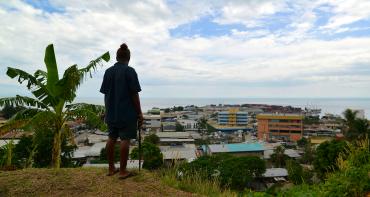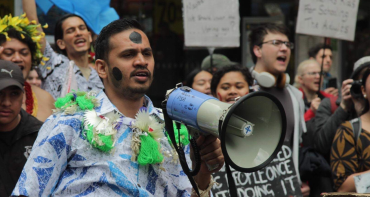The signing of the memorandum of understanding demonstrates real intent to help those with limited access to international trade finance.

It has been three years in the preparation but it took under three minutes and the flourish of three signatures, including that of the Secretary-General, for the Commonwealth Trade Finance Facility (CTFF) to move a step closer. Last Thursday's signing of the memorandum of understanding demonstrates real intent to help those with limited access to international trade finance.
Signing of MOU CFMM
“Trade is the lifeblood of economies and never more so than for small countries. Yet they simply can’t access the international financial system,” said Secretary-General Patricia Scotland. “According to the WTO, 80 to 90 per cent of world trade relies on trade finance. One of our roles in the Commonwealth family is to champion these small states to make sure they can trade in global markets.”
The Commonwealth Heads of Government Meeting in 2013 (CHOGM) asked the Commonwealth Secretariat, with support of the government of Malta, to develop plans for a finance facility. The two other signatories were the Standard Chartered Bank and the Bank of Baroda.
#Commonwealth Sec-Gen Scotland & DSG Maharaj with Representatives of Standard Chartered Bank and Bank of Baroda #CFMM2016 #Washington pic.twitter.com/ed7BwJsDRm
— The Commonwealth (@commonwealthsec) October 6, 2016
Standard Chartered Bank’s global head of transaction banking, Alex Manson, said that the role of banks in society was to do good things and the Facility was one example.
“It’s very important that such facilities are available to small nation states. As a bank we’re all about trade and commerce and facilitating that,” said Mr Manson. “In some ways it’s about business as usual but sometimes business as usual can be difficult. This is all about facilitating trade and giving it a boost, so it’s very exciting. We get to make an impact and that impact is a positive one.”
The Bank of Baroda is India’s third largest bank and the memo means that it will extend a US $40 million line of credit to small states. Its managing director and chief executive officer, P.S. Jayakumar, said the Facility ensured further investment in countries where his bank already had connections.
“The Bank of Baroda has been present in many of the African Commonwealth countries for many, many years. These are established franchises that we have got. This transaction help us to support the smaller banks in a manner which serves these customers and markets better. It is a financially well-structured transaction. It is intended to provide these banks with access they don’t have and is commercially structured to be sustainable and will help trade in these countries.”
Trade finance is critically important for the 31 countries of the Commonwealth which are designated as “small states” based on their population size. Some of the reasons why these countries face problems when trying to break into international markets include: the absence of domestic export credit agencies, reluctance of financial institutions to lend money and volatile global economic conditions.
Secretary-General Scotland said, “This is an incredibly important opportunity for small states to come together and share expertise. We were talking a lot today about creating tool kits and best practice. So the Small States Finance Initiative will do all of that and I know this is a very important step forward for the whole Commonwealth to give real concrete help and assistance to small and vulnerable states.”
The Facility, based in Malta, hopes to persuade major banks to join because of reduced risks of their investing in small states as well as a cut in the cost of doing business with them. A guarantee fund will reimburse banks, up to an agreed amount, if they lose money on their investment. It is expected that small states will have access to up to US$ 100 million of incremental trade finance over a three-year period.
Photo caption: Standard Chartered Bank’s global head of transaction banking, Alex Manson; Commonwealth Secretary-General Patricia Scotland; The Bank of Baroda's managing director and chief executive officer, P.S. Jayakumar.



